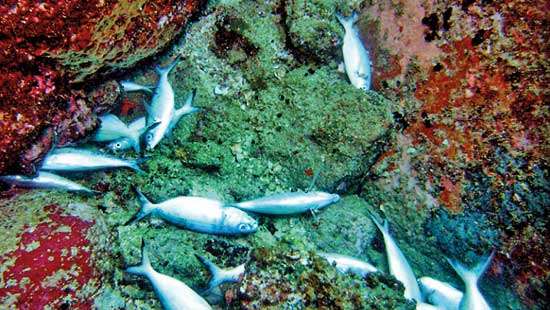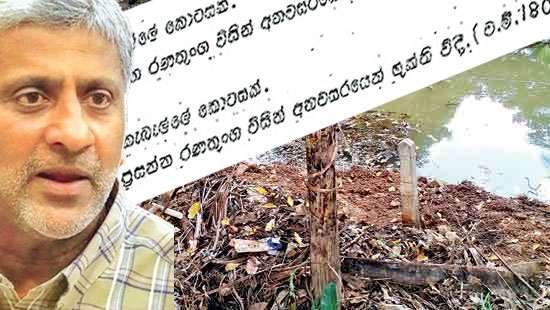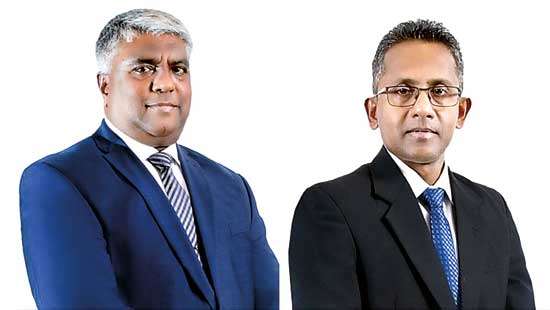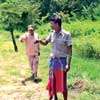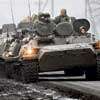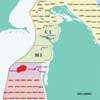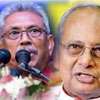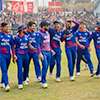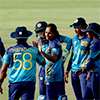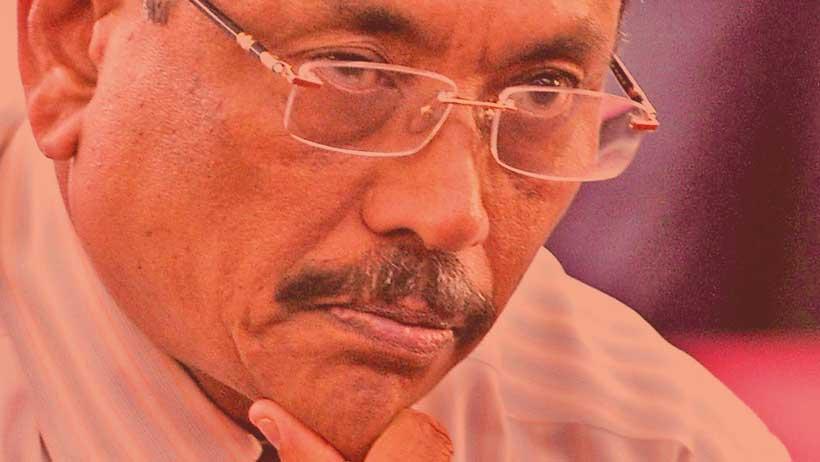
 F
Former Sri Lankan President and ex-defence secretary Gotabaya Rajapaksa known generally as Gota figured prominently in an Associated Press (AP) news report dated June 22, 2023. According to AP, Gotabaya Rajapaksa has been accused of allegedly “tampering with police records in order to hamper investigations into mass graves discovered in an area where he was a military officer at the height of a bloody Marxist insurrection in 1989”. The allegation was made in a report released last week by activist groups including the International Truth and Justice Project, Journalists for Democracy and Families of the Disappeared in Sri Lanka.
The report alleged that Gota Rajapaksa while serving as Defence Secretary under his brother President Mahinda Rajapaksa had “ ordered the destruction of all police records older than five years at police stations in the region after mass graves were discovered in the Matale District of central Sri Lanka in 2013.”
The mass graves were suspected to date from the time of a violent Marxist insurrection in 1989, when Rajapaksa, as a military officer, was involved in counter-insurgency in the region. The report called for action against Rajapaksa and senior police officials involved in the alleged hampering of the investigations.
It is well-known that Gotabaya Rajapaksa was appointed commanding officer of the 1st Battalion, Gajaba Regiment (1GR) and military coordinating officer of the Matale District during the second insurrection of the Janatha Vimukthi Peramuna (JVP) which took place from 1987 to 1990.Gota reportedly functioned in Matale District from May 1989 to January 1990. “He (Gota) was posted to Matale as the District Coordinating Officer tasked with bringing the JVP under control,” wrote well-known journalist and former envoy to the UN in Geneva, C.A. Chandraprem in his biography “Gota’s War”.
There have been numerous allegations of enforced disappearances, arbitrary detentions, torture, and extra-judicial killings being committed by Government security forces between May 1989 and January 1990, in the Matale District, during the JVP uprising. Over 700 persons most of them Sinhalese allegedly disappeared then. There has been a complete lack of accountability and judicial action against the State authorities allegedly identified as perpetrators of the violations committed so far.
Joint UN Letter on Matale
In a significant development last year, four key representatives from UN-related agencies wrote a joint letter to Sri Lankan President Ranil Wickremesinghe on November 8, 2022. The UN missive provided particulars about the Matale incidents of 1989/90 and requested a comprehensive response from the Sri Lankan Government. The UN joint letter was made available in the public domain on January 9, 2023. In keeping with certain protocols, the UN redacted the name of the official in charge of Matale District in 1989/90. Relevant paragraphs from the UN letter are reproduced below:
“We have the honour to address you in our capacities as Working Group on Enforced or Involuntary Disappearances; Working Group on Arbitrary Detention; Special Rapporteur on extrajudicial, summary or arbitrary executions and Special Rapporteur on the promotion of truth, justice, reparation and guarantees of nonrecurrence.
We would like to bring to the attention of your Excellency’s Government information we have received concerning the alleged enforced disappearances, arbitrary detentions, torture, and extra-judicial killings, reportedly committed by Government security forces between May 1989 and January 1990, in the Matale District, in the context of the Janatha Vimukthi Peramuna (JVP) uprising.
According to the information received: Between May 1989 and January 1990, Government security forces in the Matale District allegedly carried out enforced disappearances, arbitrary and unlawful detentions, and extra-judicial killings, in the context of escalating violence between the Janatha Vimukthi Peramuna (JVP) and the Government of Sri Lanka.
It is reported that, during this period, the Government deployed then commanding officer of the 1st Battalion, Gajaba Regiment, as District Military Coordinating Officer of the Matale District, where he controlled all security forces deployed in the district, including intelligence forces.
Commissions of Inquiry
Starting in 1989, Commissions of Inquiry were set up by the Government to investigate human rights violations that had reportedly occurred during, and subsequent to, the uprising. The Commissions received complaints alleging enforced disappearance, torture, extra-judicial killings, and arbitrary and lawful detentions that had been carried out by security forces in the Matale District.
The information received points to and the security forces under his control (mostly the “Gajaba Regiment”) as the main perpetrators. According to the Commission’s reports, would have known about the scale of violence in the small district of Matale, which only had a population of 350,000 at the time.
It is reported that four different Commissions of Inquiry investigated the enforced disappearances of persons that took place between May 1989 and January 1991.
The Commissions documented 1,041 cases of enforced disappearance in the Matale District, from which more than 700 cases occurred between May 1989 and January 1990.
The Commission’s also compiled a list of 24 alleged perpetrators of enforced disappearance in the Matale District. This list, however, was never published and was reportedly placed under a government secrecy order set up to run until 2030.
The list includes army and police officers under his command who reportedly had been present at various detention sites, as well as schools and guest houses known as “notorious torture sites”.
The Commission’s also documented instances of arbitrary and unlawful detention and torture (including sexual torture) of detainees. Commissions’ reports noted that it was well known at the time that people were stopped and detained at checkpoints, or as part of roundups and mass arrests in villages and were abducted by officials who identified themselves as belonging to the State security services using unmarked government vehicles. Those detained and abducted included young men and boys from villages in the Matale District.
Vijaya College Army Camp
Evidence was also collected from former detainees who had survived detention in army or police custody at Vijaya College Army Camp and other places of detention in Matale District. Prisoners testified to being blindfolded and beaten, including while “being hung upside down”, and “being forced to inhale chilli fumes.”
The Commissions documented one specific case of a victim who was arrested in September 1989 and held at Vijaya College Army camp for a period of 40 days and brutally tortured while in detention. The Commissions also collected evidence of extra-judicial killings of civilians during this period, many of whom would have been arbitrarily and unlawfully detained and taken into custody.
The allegations received also refer to instances in which human remains of victims were left in fields or displayed on bridges. It is also reported that the alleged perpetrators have not been charged or tried and have continued to hold positions in the Government.
While we do not wish to prejudge the accuracy of these allegations, we express our serious concern at the alleged enforced disappearances, arbitrary detentions, torture, and extra-judicial killings, reportedly committed by Government security forces between May 1989 and January 1990, in the Matale District, and the ensuing lack of accountability and judicial action against the alleged perpetrators of these human rights violations.
While awaiting a reply, we urge that all necessary measures be taken to investigate and ensure the accountability of any person(s) responsible for the alleged violations.
Please accept, Excellency, the assurances of our highest consideration.
1. Aua Baldé Chair-Rapporteur of the Working Group on Enforced or Involuntary Disappearances
2. Mumba Malila Vice-Chair of the Working Group on Arbitrary Detention
3. Morris Tidball-Binz Special Rapporteur on extrajudicial, summary or arbitrary executions
4. Fabian Salvioli Special Rapporteur on the promotion of truth, justice, reparation and guarantees of non-recurrence.
| According to AP, Gotabaya Rajapaksa has been accused of allegedly “tampering with police records in order to hamper investigations into mass graves discovered in an area where he was a military officer at the height of a bloody Marxist insurrection in 1989 |
Three Important Points
Three important aspects concerning the suppression of the JVP revolt in Matale District have been highlighted in this UN letter.
Firstly 1,041 cases of enforced disappearances in Matale District have been documented through four commissions of inquiry. Of these more than 700 allegedly occurred when Gota was in charge as the chief military officer.
Secondly, the four Sri Lankan commissions appointed at different times by different governments have identified 24 persons as perpetrators allegedly involved in the enforced disappearances in Matale. There is no information of any action being taken against anyone in this regard.
Thirdly the names and designations of those allegedly responsible for the Matale “disappearances” have been placed under a government secrecy order set up to run until 2030. This is an indicator of institutionalised impunity.
As stated earlier the name of Gotabaya Rajapaksa has been redacted and does not appear in the UN letter made public. However, it is open knowledge that Gota was the chief coordinating military officer in charge of Matale District from May 1989 to January 1990 during which over 700 enforced disappearances took place.
| The mass graves were suspected to date from the time of a violent Marxist insurrection in 1989, when Rajapaksa, as a military officer, was involved in counter-insurgency in the region |
Gota’s “Command” Role
However, Gota’s “command” role in Matale District and the circumstances under which he was placed in charge by a UNP Government is recounted by C.A. Chandraprema in his book “Gota’s War”. The following are excerpts from pages, 173, 174 and 177 in the book’s Chapter 28 titled “The second JVP insurrection”.
“On May 1, 1989, with Colonel Wimalaratne being promoted to the rank of Brigadier, Gota was made the commanding officer of the 1st Battalion of the Gajaba Regiment. This was now a permanent appointment unlike the temporary command he held during the Vadamarachchi operation.”
“With this promotion, he was posted to Matale as the District Coordinating Officer tasked with bringing the JVP under control. The 1st Gajaba Battalion, which had been in Trincomalee for nearly one and a half years, was brought down to Matale. Lieutenants Shavendra Silva, Jagath Dias and Sumedha Perera were among his company commanders in Matale” (all three became Generals later with Shavendra ending up as Army chief).
| 1,041 cases of enforced disappearances in Matale District have been documented through four commissions of inquiry. Of these more than 700 allegedly occurred when Gota was in charge as the chief military officer |
Ranjan Wijeratne
“When Gota was appointed coordinating officer of the Matale District, the ruling party politicians of that area had complained to the powerful Deputy Defence Minister Ranjan Wijeratne that Gota was Mahinda Rajapaksa’s brother and that they had no faith in him”.
“At that time, Mahinda Rajapaksa was back in parliament after an interval of 12 years and was a vocal critic of the manner in which the UNP government was handling the JVP insurrection.
At that time Brigadier Wimalaratne was director operations of the Joint Operations Command. He had told Ranjan Wijeratne that it was up to the Government to decide whom to appoint as the coordinating officer for Matale. However, he had pointed out that Gota was serving in Matale as the commander of the 1” Gajaba Battalion and that he could not be removed from the position of battalion commander because he was a good officer who was committed and professional in his work.”
“Brigadier Wimalaratne had explained to Wijeratne that Gota had fought in Vadamarachchi and given him details of other operations that he had carried out. Wijeratne had agreed that Gota should not be removed from his position.”
“Later, Wijeratne came to Matale and Gota organised a conference for him and he explained what he was going to do to secure the district against the JVP terrorists. After the conference, Wijeratne told him that the area’s politicians don’t want him because he is Mahinda Rajapaksa’s brother but that his commander says he is a good military officer and has earned the command of the battalion. Wijeratne had added, “I don’t want to change you, you get on with the job and if any of the politicians give you trouble, tell me.”
“After Gota took over the Matale District, detachments were posted in every strategically important location.”
“Gota remained the security coordinating officer of Matale until the end of the second JVP insurrection. In January 1990, he applied for three months’ leave and went to the USA to see his family.”
D.B.S. Jeyaraj can be reached at dbsjeyaraj@yahoo.com




